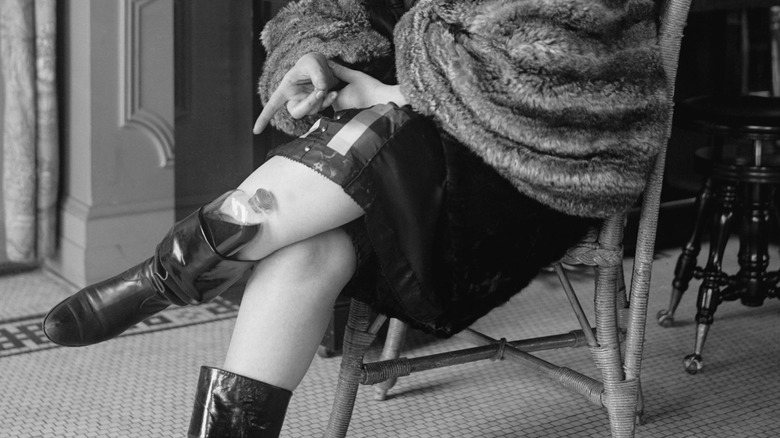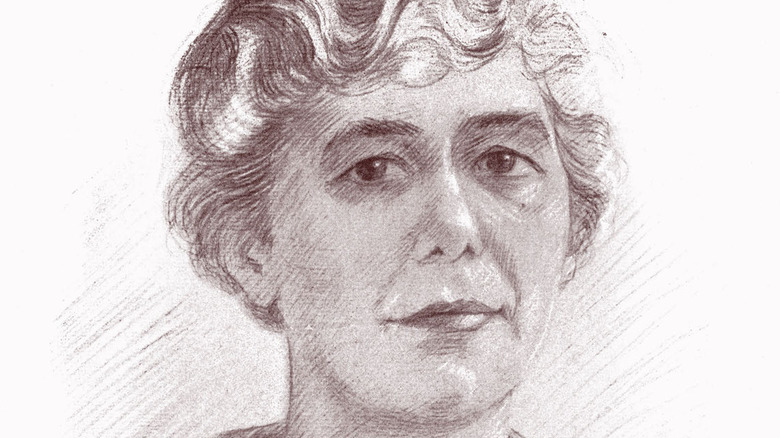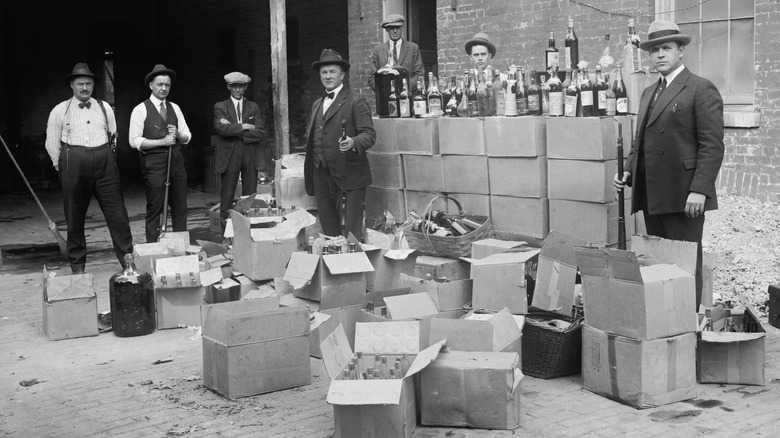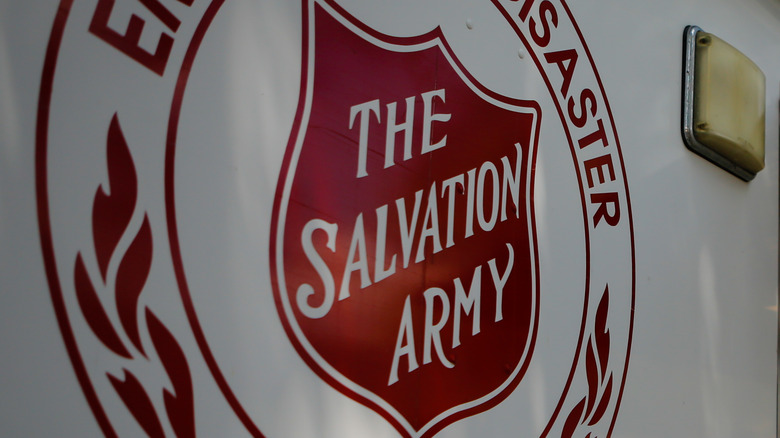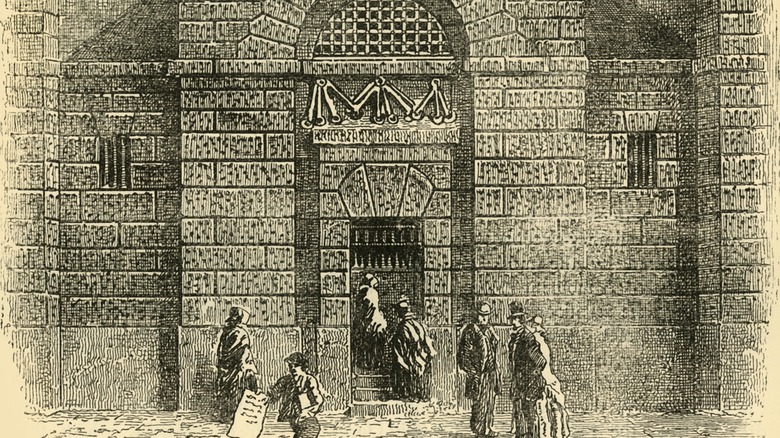Where Did The Phrase Fall Off The Wagon Come From?
To "fall off the wagon" means "to start drinking alcohol again after having stopped," according to Merriam-Webster. But why is this the phrase that we use to describe giving up sobriety? Does it have to with being so drunk you can't even sit in a wagon as a passenger, let alone drive? The truth is that the proverbial wagon doesn't refer to something people would be riding at all. Instead, it dates back to a forgotten fixture of turn-of-the-century American life.
During the late 19th century, roads in the U.S. were not yet paved, so whenever there was heavy traffic, horses' hooves would kick up an enormous amount of dust, according to pThe Phrase Finder. To combat that, cities and towns would send out something called a water wagon or a water cart to spray down the roads and prevent dust from rising. The phrase "on the wagon" or "on the water cart" therefore originally applied to a preference for water over alcohol, so falling off the wagon meant the opposite.
Temperance and prohibition
The history of the phrase is associated with the history of the temperance movement in the U.S. The temperance movement was a effort to ban the production and sale of alcohol, that lasted from 1800 to 1933, according to Ohio History Central. Proponents argued that drinking was immoral and threatened the health of the nation. Many women supported temperance because it would stop their husbands from spending money on liquor instead of food or clothing for their families.
Early proponents of temperance just wanted people to switch from hard liquor to beer or wine, according to Virginia Commonwealth University. However, 19th-century U.S. residents did not drink in moderation. In 1830, the average U.S. resident over the age of 15 drank nearly seven gallons of alcohol a year — three times more than today. Soon temperance groups called for total abstinence. They would rally people to their cause with lectures, marches, songs, and publications.
By 1869, the movement turned political. The Prohibition Party formed and was instrumental in passing the 18th Amendment banning the "manufacture, sale, or transportation of intoxicating liquors" in the U.S. This amendment was passed by Congress in 1917 and ratified in 1919 and led to the Prohibition Era. Many people ignored the law, however, and bootlegging and organized crime took advantage of the situation. Law enforcement could not keep up with illegal alcohol manufacturing and sales, so the 21st Amendment was passed in 1933, ending Prohibition. The entire nation fell off the wagon.
On the water cart
The phrase "on the water cart" emerged at the height of the temperance movement in the 1890s, according to the "Encyclopedia of Word and Phrase Origins" (via The Phrase Finder). Men who had pledged to abstain from alcohol would say that they would rather climb on the water cart wetting roads than consume beer, wine or liquor. The first instance of the phrase is recorded in a book called "Mrs. Wiggs of the Cabbage Patch" by Alice Hegan Rice (above). This book became a bestseller when it was first published in 1901, according to the University Press of Kentucky.
The novel told the ultimately hopeful story of a family trying to survive in the "cabbage patch" slum of Louisville, Kentucky. It went on to inspire several films, plays, and radio productions. This included a 1934 movie starring W.C. Fields, according to IMDb. The phrase comes when Mrs. Wiggs is speaking about a man named Mr. Dick who is sick with consumption. "Other day he had a orful spell while I was there," she says in the book. "I wanted to git him some whisky, but he shuck his head. 'I'm on the water-cart,' sez he" (via "Mrs. Wiggs of the Cabbage Patch," posted at Project Gutenberg).
From cart to wagon
The phrase "on the wagon," as opposed to "on the water cart," was in use by 1904, according to the Online Etymology Dictionary. The phrase "off the wagon" emerged not long after, according to the "Encyclopedia of Word and Phrase Origins" (via The Phrase Finder). A famous example of the wagon version of the phrase came from the temperance leader William Hamilton Anderson, who was heavily involved with the Anti-Saloon League, according to The University of Chicago Library. The Anti-Saloon League was a temperance group that became the primary force lobbying for prohibition at the turn of the 20th century, according to Virginia Commonwealth University. The group used both the media and political pressure to push for prohibition.
Anderson held important positions in the Anti-Saloon League in Illinois and New York between 1900 and 1924, according to The University of Chicago Library. As the General State Superintendent of the Anti-Saloon League of New York, he managed to increase the number of New York congressmen supporting the 18th Amendment from three in 1914 to 14 in 1917. When the amendment passed, he said," Be A Good Sport — Shake Hands With Uncle Sam and Board [his] Water Wagon," as the Richmond Virginian reported in 1920.
Origin myth: the Salvation Army
There are also some myths about how the phrase "off the wagon" emerged. The Salvation Army takes credit for the phrase on its website. "Former National Commander Evangeline Booth — founder William Booth's daughter — drove a hay wagon through the streets of New York to encourage alcoholics on board for a ride back to The Salvation Army. Hence, alcoholics in recovery were said to be 'on the wagon,'" the organization says.
The claim makes a certain amount of sense because The Salvation Army was associated with the temperance movement. It was founded in 1864 in London by former Reformed Methodist minister William Booth as a Protestant Christian group that required its members to give up alcohol, tobacco, gambling, and other vices, according to History Collection. It arrived in the U.S. in 1880 and became an important part of the temperance movement there as well. However, World Wide Words says its association with the phrase is a "folk etymology."
Origin myth: prison
Another "folk etymology" ties the phrase to prison, according to World Wide Words. The legend says that prisoners used to ride to jail on the back of a wagon. Before they reached their final destination, they were allowed one last drink at the local pub. Then they had to get back on the wagon and head to prison, where alcohol was not permitted.
Another version of this myth involves condemned prisoners traveling from Newgate Prison in the U.K. to be hung at Tyburn. Opened in the 12th century, Newgate Prison was once the most notorious prison in London, according to Historic UK. Until the late 1700s, London's public gallows were in Tyburn, in what is now the West End area of London. Legend has it that before reaching the gallows, condemned prisoners were granted one last drink at the hostelry before getting back on the wagon to face execution and, therefore, permanent sobriety, according to World Wide Words. However, this is not the phrase's true origin. In perhaps a final defeat for the temperance movement, today "off the wagon" is a popular name for bars, including one in New York City's Greenwich Village (via the Off the Wagon website).

